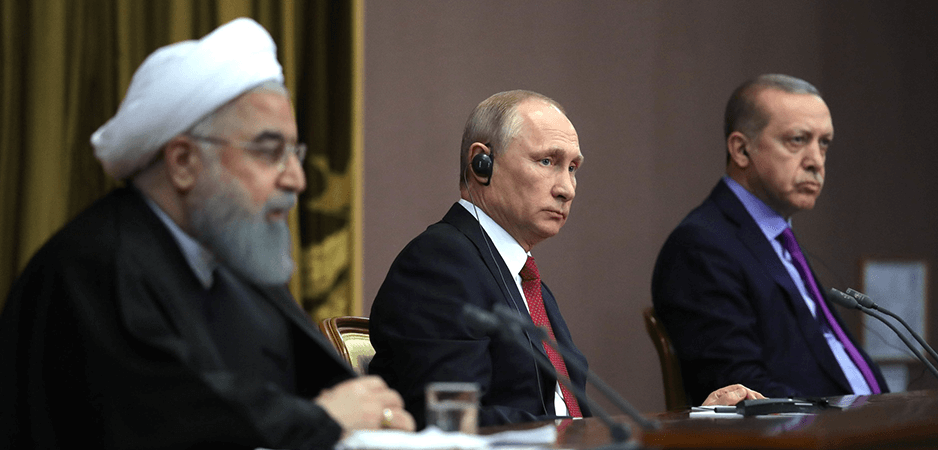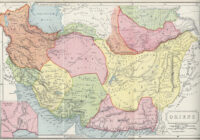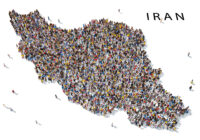The Tehran summit may eventually bring about an end to the fighting as we’ve known it, but not the peace desired by the people of Syria.
Last week’s gathering in Tehran of the presidents of Russia, Iran and Turkey produced predictable happy talk, but offered little hope for Syrians now deep into their devastating seven-year civil war.
Actually, it’s rather easy to understand why Russia’s Vladimir Putin, Iran’s Hassan Rouhani and Turkey’s Recep Tayyip Erdogan failed to make progress to reach peace. It wasn’t on the agenda.
To be sure, each of the three leaders doubtlessly came to Tehran, the latest iteration of summits among the Astana troika, believing that if only his allied counterparts would embrace his proposal, peace and Syrian reconstruction would follow. But their proposals were riddled with ideas to advance individual interests. Interests of Syrians seem to have been an afterthought, if considered at all.
The Tehran summit was ostensibly a meeting to discuss Syria. But was a representative of Syrian President Bashar al-Assad even present or party to the discussions, to say nothing of the disparate Syrian opposition? (This assumes that Assad has a say in in his country’s future.) And where was the US, which still maintains a not inconsequential force of some 2,200 US Special Forces and marines in the country’s east? Also unrepresented was Syria’s most effective opposition fighting and political force: the largely Kurdish, YPG militia-dominated Syrian Democratic Forces (SDF).
There were appeals from UN Secretary General Antonio Guterres and United Nations High Commissioner for Refugees Filippo Grandi, but those related mostly to the impending donnybrook in Idlib province in northwestern Syria. Forces from the troika and Syria are poised to launch an all-out assault on the province, home to some 3 million civilians, but also to at least 10,000 al-Qaeda-affiliated fighters. In their most recent statements, the UN officials mentioned little of the broader challenges of Syria and settlement of a war that’s cost the lives of nearly half a million Syrians — the UN stopped counting over a year ago and no one knows the actual figure — and forced half the country’s population (more than 12 million) to flee their homes.
UN Special Envoy Steffan de Mistura issued a caution of the consequences of an Idlib operation on UN efforts to redraft the Syrian Constitution. But while the troika may tolerate that process, they won’t sanction a constitution that doesn’t align with their individual agendas. The US opposes an Idlib operation, too, and has issued warnings of dire consequences should Assad again resort to chemical weapons.
Conflicting Interests, But Who’s Looking Out for Syrians?
Russia and Iran want Syria firmly back in Assad’s hands. Turkey doesn’t but likely has given up trying to push the reviled dictator out; even the US has given up its “Assad must go” assertions. But Syria can’t be wholly under Assad as long as renegade Idlib remains under control of extremists and others just trying to survive. Turkey cannot afford to see an Aleppo-style onslaught on Idlib as it would force tens of thousands of refugees to flee to the only safe haven now left to them, Turkey. Turkey already hosts 3.5 million Syrian refugees. In Tehran, Turkey managed to buy a bit more time to attempt to negotiate a way out of a hemorrhage in Idlib.
The extremists now based in Idlib seem willing to fight to their inevitable end — and sadly to that of so many innocent Syrian civilians. It’s no surprise why they’re described as extremists. They have recently taken to threatening hanging anyone in Idlib province suspected of sympathizing with either the regime or outside forces. Ankara will face major difficulties in persuading these extremists to lay down arms. One reason: where would they go? Who will take an al-Qaeda terrorist? Their intransigence provides the troika with the veiled excuse of “ridding Idlib of terrorists” they often use to justify a full-scale operation on the province.
Iran not only wants to preserve Assad, but also maintain its presence in Syria and strong influence in Damascus. Turkey would prefer otherwise and the US also has expressed continued opposition, fearing the combustible nature of Iranian troops and Tehran-backed Shia mercenaries on the borders of Israel and Jordan, two of America’s staunchest allies in the Middle East.
Russia would doubtlessly prefer to see a diminished Iranian presence in Syria and, under the right circumstances and perhaps an offer from the Americans, might be persuaded to turn up the heat on Iran. But those circumstances are not yet in the offing, and with the battle of Idlib looming, now isn’t the time to cross Iran whose leadership in the ground battle there will be indispensable.
America seems committed at present — not withstanding the waffling of its mercurial president — to keeping its forces in eastern Syria and to supporting the SDF for now. That’s a major headache for Syria since the country’s limited oil producing capacity is based there. Getting the Americans to vacate Syria will be tough, meaning Assad may have to wait a while before getting all the country he once had under his control. Moreover, US support will be vital to Syria’s reconstruction, whatever Putin and Rouhani may think. The US now has the negotiating leverage it never had under Barack Obama to impact negotiations, albeit limited. Moscow and Tehran know this, but they still seem determined to do Syria their way — without the US at the table.
The US and Europe Are Essential to Reconstruction
The troika want to see reconstruction in Syria and their share of anticipated spoils. Without the broader support of the international community, however, most especially Western capital, effective reconstruction is likely to be stillborn. The West or indeed any prudent aid donor, government or business/bank is likely to steer clear of a war-ravaged nation run by a universally recognized crook supported by the likes of Russia and Iran. Reconstruction that reaches the lives of everyday Syrians simply isn’t realistic.
All governments — most especially those of Jordan, Lebanon, Europe and, of course, Turkey, which host the nearly 6 million — would like to see Syrian refugees return home. But how likely is that when the troika stand firmly behind the very leadership they fled? Even those desperate to return will want to see Idlib resolved peacefully and a genuine reconstruction effort underway.
The three leaders who went to Tehran were negotiating in front of a mirror. Representatives of the Syrian people and of those governments also with a stake in Syria were absent. In such circumstances, it’s hardly likely that peace — other than through an Aleppo-style military battering — can be achieved. And that approach merely assures the status quo ante, which was what the 2011 uprising and civil war were all about.
Tehran, like its predecessors, demonstrates the flaws of the Astana process. It may eventually bring about an end to the fighting as we’ve known it, but not the peace desired by the people of Syria. Until all the outside powers as well as Assad are prepared to dial back their own interests in Syria, those of the Syrian people cannot be met and there can be no genuine peace.
The views expressed in this article are the author’s own and do not necessarily reflect Fair Observer’s editorial policy.
Support Fair Observer
We rely on your support for our independence, diversity and quality.
For more than 10 years, Fair Observer has been free, fair and independent. No billionaire owns us, no advertisers control us. We are a reader-supported nonprofit. Unlike many other publications, we keep our content free for readers regardless of where they live or whether they can afford to pay. We have no paywalls and no ads.
In the post-truth era of fake news, echo chambers and filter bubbles, we publish a plurality of perspectives from around the world. Anyone can publish with us, but everyone goes through a rigorous editorial process. So, you get fact-checked, well-reasoned content instead of noise.
We publish 2,500+ voices from 90+ countries. We also conduct education and training programs
on subjects ranging from digital media and journalism to writing and critical thinking. This
doesn’t come cheap. Servers, editors, trainers and web developers cost
money.
Please consider supporting us on a regular basis as a recurring donor or a
sustaining member.
Will you support FO’s journalism?
We rely on your support for our independence, diversity and quality.






